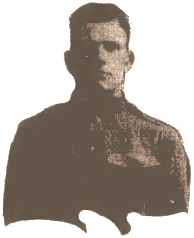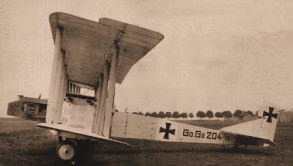The machine Hickman describes was probably
George Washington Hickman a German Gotha bomber, as pictured above.
SOLDIER DESCRIBES AIR RAID IN FRANCE
---------
LOGAN, Nov. 8 [1918].---George W. Hickman, in France, writes to his father, Prof. J.E. Hickman, a vivid description of an air raid. Young Mr. Hickman is one of the editors of The Stars and Stripes. His letter follows:
"My Dear Father: You ask me to describe an air raid to you. I believe I have done so before, but I shall try again, because there is a very vivid remembrance of one we had just two nights ago, when I was the only one left in the hotel. A half dozen machines took part, dropping about 30 high explosive bombs wrecking several houses and killing four British soldiers.
"It is just dark. There is not a cloud in the sky; the moon has not yet peeked above the horizon. It is unusually calm and the only noise to be heard is that made by the Lorries as they pass up the road and the even steady purr to their motor dies away in the distance. All is quiet again. Your thoughts begin to lag as you doze in the silence that enshrouds you. A factory whistle blows, now another, then a whole chorus of them sends out a long shrill whistle. No, the workmen are not changing shifts, nor does the whistle signify a recess, but a warning that the 'Boche,' 'Jerry,' or 'Fritz,' which all mean one and the same thing, has crossed the front lines and is headed in this direction. Your dozing suddenly ceases, those lagging thoughts now begin to go and come with lightning speed. You go to the window, the door--into the street--anywhere to catch a sound of the on-coming Hun. Five minutes pass, you hear nothing, except the traffic noise of hurrying people as they come from every street and alley, making for cellars and dugouts. Of course you're a newly arrived American; you neither look for shelter nor bother about advancing toward favorable dugout, but you're out in the middle of the street with your head cocked to one side, holding your good ear high in the air and, at the same time, trying to scan the zenith with an eagle eye. You imagine that you see lights come and go and then you begin to feel as though your head begins to nod very slightly. Your breathing seems to take up the cadence and all of a sudden you are aware of the fact that your head is seemingly keeping in cadence with the purr of the rise and fall of a far-distance sound--just a murmur. Now you hear the swell and lull of the sound distinctly. It's the peculiar noise of the Hun's motor and the unmistakable evidence that it's an enemy machine.
Comes on Undaunted.
"All the time 'Mr. Boche' comes on undaunted by any resistance except to occasionally dodge a shaft of light. The roar of the motor has increased greatly. From the sound, it seems as though he must be right over you; but still he comes. You distinguish two or three motors, but the volume of sound increases until it seems your brain begins to reel, trying to count and listen for distinct sounds. All at once you are conscious of seeing everything around, even you are casting a shadow upon the sidewalk. You can see up and down the street, as the sun had suddenly appeared. Have I gone blind? Am I seeing things? Or what has happened. For a moment one blinks his eyes and ducks his head as if dodging some obstacle hurled at him. You look up, and there's a great flare bursts out for 'Fritz' has shot a blazing bomb from a special gun towards the earth. It has lit the whole heavens, like an August dawn. As the flare fails it diminishes and suddenly goes out. Before you hardly sense the darkness, there comes the sound of a violent explosion. 'Bang! Bang! Bang!' You hear the crashing of buildings and screams of frantic women. The glass in the windows about you begins to fly in all directions, though the bombs fall blocks away.
"For a minute you are dazed by the rapidity of those succeeding events. Suddenly you make a duck for cover; or, if you've been up to the lines before, you'll probably go flat upon your 'belly,' paying no particular attention whether the gutter you make a head-dive for, is filled with water or rubbish. Not infrequently one lands on a comrade who has been the quicker and hit the spot first. Of course 'what goes up must come down' and hence you light on top, but neither objects. You no sooner hit the ground than again comes that 'bang! bang! bang!' The houses around you rock, the whole earth seems to vibrate and quiver under you; and unconsciously you duck and hug the ground as though you would like to become a very part of it; and I dare say a 'flap jack' was never made flatter than you get as you lie there half wondering, half fearful lest the next bomb crashes down on you. Again they go 'bang! bang!' but this time they sound farther away, and you feel little or no concussion. You raise your head to hear the fast-receding sounds of the 'cat-dying motor,' as it speeds away. You get up, look around, scan the heavens; the anti-air craft guns that have been going all the while suddenly cease. The flash lights are switched off and all is serene and calm. You take a deep breath, you feel a great relief as though a belt which had been cinched around your waist, uncomfortably tight, had been released; and for the first time, you realize you have been under a great nervous strain and every muscle has been in a rigid state and every nerve as tense as steel. for as you hear the weird noise made by the bombs, as they whistle through the air, every nerve along the spine seems to have turned into an icicle and hence there is sent over your body a multiple of sensations so peculiar that to experience it is the only adequate means of description.
Back Into the House.
"You brush off your clothes and walk back into the house, sometimes only to repeat the experiences of the last 15 minutes. Now mind you, American soldiers are human and grow wise to this warfare in time; so it may be, and usually is, that after being in one or two bad raids you'll find young 'Yank' taking his place in the nearby cellars and dugouts with the rest of the fleeing refugees.
"This description would never be complete without a brief glance at the scenes left behind. 'Mr. Hun' and his bombing plane are being quietly overhauled at some airdrome.
"The forbodance, the anticipation of an air raid, is often worse than the actual event. for here in a city of several thousand people there are nightly migrations of the population from homes to caves of protection, which are usually, as in this case, on the outskirts of the city. Just before sun down, you may see groups of people moving slowly along the streets to the bomb-proof dugouts. There are old men and old women, gray haired and with faltering step; there are mothers--old and young--with babes in arms and with children trailing by their side or after them. Some carrying pillows, some small quilts, anything that will keep those childish heads from off the ground. Some look back, some straight ahead, others at various intervals, turn around to get a last glance at the old home. It may be a shack, four walls of brick or stone; it may be ill furnished, but all that counts for little, because to them it is home. Each night they leave it not knowing but that upon the morrow they will return to piles of ruins.
"I have seen no young men accompanying the refugees for the young men are elsewhere. Hence these young wives, these young mothers, these old men toil from day to day, but not with the idea that it would be better to sacrifice everything for peace--a peace that would merely stop the enemy at his present boundaries; but they are willing and are sacrificing all that the power of this formidable neighbor and his ambitions for the autocracy of the world shall be broken for all time. They suffer greatly and say nothing, only determine to suffer more if need be. So the 'Hun' may go on with his bombing; he may wreck their homes and kill their loved ones; he may cause them untold agonies of privations, but he will never so lower the spirits of the French people as to drive them to surrendering despair, for with tears in their eyes they will still shrug their shoulders and say, 'c'est la Guerre' (meaning, 'O it is the war') and go on."
--Deseret Evening News, Nov 9 1918.
The above article was discovered and brought to my
attention by the noted Utah historian Ardis Parshall.
George Washington Hickman was a son of Josiah Edwin Hickman and Martha Ella Rogers Hickman. He was born 21 January 1895.
During the war he was a Sergeant in the 163rd Infantry, and was Field Agent for the military newspaper The Stars and Stripes.
After the war on 11 April 1921 he married Luella Elizabeth Anderson at Logan, Utah. He died 29 November 1954.
If anyone has additional information on him, please share it with us. Click here to write me.
To see another picture of George W. Hickman, click here.
To learn more about Paris during World War I, click here.
To read any issue of The Stars and Stripes, click here.
To learn more about Prof. Josiah E. Hickman, click here.
To return to the Hickman Family index page, click here.
.


The Germans introduced the concept of psychological warfare during World War I by terrorizing civilians in a variety of ways. The aircraft described below were far more effective at dispensing fear than of doing actual damage, but they performed that task so well that terrorism of this kind has been a part of war ever since, and with ever more terrible weapons. It must have been scary having bombs randomly dropped on you out of the night sky. More scary then than now, because then it was a new development in an increasingly awful war.
The following is a letter from our George W. Hickman in 1918 that was printed in the Deseret News.